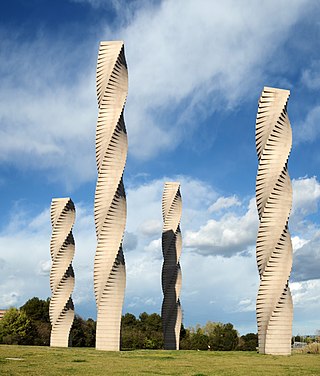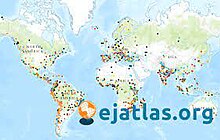
The Autonomous University of Barcelona is a public university mostly located in Cerdanyola del Vallès, near the city of Barcelona in Catalonia, Spain.

Ecological economics, bioeconomics, ecolonomy, eco-economics, or ecol-econ is both a transdisciplinary and an interdisciplinary field of academic research addressing the interdependence and coevolution of human economies and natural ecosystems, both intertemporally and spatially. By treating the economy as a subsystem of Earth's larger ecosystem, and by emphasizing the preservation of natural capital, the field of ecological economics is differentiated from environmental economics, which is the mainstream economic analysis of the environment. One survey of German economists found that ecological and environmental economics are different schools of economic thought, with ecological economists emphasizing strong sustainability and rejecting the proposition that physical (human-made) capital can substitute for natural capital.
Environmental justice or eco-justice, is a social movement to address environmental injustice, which occurs when poor or marginalized communities are harmed by hazardous waste, resource extraction, and other land uses from which they do not benefit. The movement has generated hundreds of studies showing that exposure to environmental harm is inequitably distributed.
A human rights defender or human rights activist is a person who, individually or with others, acts to promote or protect human rights. They can be journalists, environmentalists, whistleblowers, trade unionists, lawyers, teachers, housing campaigners, participants in direct action, or just individuals acting alone. They can defend rights as part of their jobs or in a voluntary capacity. As a result of their activities, human rights defenders (HRDs) are often subjected to reprisals including smears, surveillance, harassment, false charges, arbitrary detention, restrictions on the right to freedom of association, physical attack, and even murder. In 2020, at least 331 HRDs were murdered in 25 countries. The international community and some national governments have attempted to respond to this violence through various protections, but violence against HRDs continues to rise. Women human rights defenders and environmental human rights defenders face greater repression and risks than human rights defenders working on other issues.

Romania ranks tenth in the world in terms of the diversity of minerals produced in the country. Around 60 different minerals are currently produced in Romania. The richest mineral deposits in the country are halite.

Environmental issues are disruptions in the usual function of ecosystems. Further, these issues can be caused by humans or they can be natural. These issues are considered serious when the ecosystem cannot recover in the present situation, and catastrophic if the ecosystem is projected to certainly collapse.

Joan Martinez Alier is a Catalan economist, Emeritus Professor of Economics and Economic History and researcher at ICTA at the Autonomous University of Barcelona. He has made important contributions in ecological economics and political ecology, which he synthesised in his work on environmentalism of the poor.

The Mesoamerican Society for Ecological Economics (SMEE) is a regional chapter of the International Society for Ecological Economics (ISEE). After its foundation in 2008 at Guatemala City, the organization has already celebrated its first International Conference in 2010 at Mexico City and will carry out the second International Conference, EcoEco Alternatives, between March 4 and 8 2014 at the main campus of the University of Costa Rica.
The Sorowako mine is a large mine in the east of Indonesia in the Verbeek Mountains of Sulawesi. It lies just south of Lake Matano. As of 2023, Sorowako is one of the largest nickel mines in the world with nickel reserve of an estimated 109.4 million tonnes of ore grading 1.79% nickel. The 109.4 million tonnes of ore contains 1.95 million tonnes of nickel metal.
Lara Super Thermal Power Station is a coal-fired power project located near village Lara, Taluk Pussore, Raigarh district in Indian state of Chhattisgarh. The power plant is one of the coal based power plants of NTPC. The coal requirement will be obtained from Talaipalli coal block Mand Raigarh Coalfield and water requirement will be sourced from Mahanadi River through Saradih Barrage.
Sanya Hongtangwan International Airport is an airport planned to be built to serve the city of Sanya in Hainan Province, China. It would be located on an artificial island in Hongtang Bay, about 20 kilometres (12 mi) west of Sanya. Construction began in 2017, and the airport was expected to be opened in December 2020. However the same year, the project was suspended pending a new environmental assessment following complaints from Chinese environmental agency Friends of Nature. In 2020, part of the construction of the artificial island was deemed illegal, and further land reclamation was halted. In the new plans, the land reclamation was reduced by 0.9 km2 (0.35 sq mi).

Kurt D. DelBene is an American business executive who serves as the assistant secretary for information and technology and CIO at the Department of Veterans Affairs. Before taking this role, he was an executive vice president at Microsoft. DelBene has also previously served as senior advisor to the United States Secretary of Health and Human Services, appointed by President Obama to oversee the implementation and improvement of the Affordable Care Act, HealthCare.gov. Prior to that, he served in several leadership roles at Microsoft, including president of the Microsoft Office division from 2010–2013.
Ecologically or ecological unequal exchange is a concept from ecological economics that builds from the notion of unequal exchange. It considers the inequities hidden in the monetary value of trade flows not only in terms of wages, and quantities of labor but also regarding materials, energy and environmental degradation. As labor is also a form of energy, unequal exchange of embodied labor can even be considered a subset of the wider phenomenon of ecologically unequal exchange. There is an uneven utilization of the environment at the global level not only due to the uneven distribution of resources, but also to shift the environmental burden. The consumption and capital accumulation of core countries are based on environmental degradation and extraction in periphery countries. Sustainability analysis and solutions with a production-based perspective in core countries may thus keep increase unsustainability at the global level. The current configuration of global production networks that leads to this asymmetric trade patterns has evolved historically with colonialism. Whereas ecological unequal exchange is a concept developed in academia, the concept of ecological debt is used in an activism context of environmental justice. The latter defines the accumulation of this unequal exchange through history
Environmental defenders or environmental human rights defenders are individuals or collectives who protect the environment from harms resulting from resource extraction, hazardous waste disposal, infrastructure projects, land appropriation, or other dangers. In 2019, the UN Human Rights Council unanimously recognised their importance to environmental protection. The term environmental defender is broadly applied to a diverse range of environmental groups and leaders from different cultures that all employ different tactics and hold different agendas. Use of the term is contested, as it homogenizes such a wide range of groups and campaigns, many of whom do not self-identify with the term and may not have explicit aims to protect the environment.

Environmental conflicts, socio-environmental conflict or ecological distribution conflicts (EDCs) are social conflicts caused by environmental degradation or by unequal distribution of environmental resources. The Environmental Justice Atlas documented 3,100 environmental conflicts worldwide as of April 2020 and emphasised that many more conflicts remained undocumented.
Environmentalism of the poor is a set of social movements that arise from environmental conflicts when impoverished people struggle against powerful state or private interests that threaten their livelihood, health, sovereignty, and culture. Part of the global environmental justice movement, it differs from mainstream environmentalism by emphasizing social justice issues instead of emphasizing conservation and eco-efficiency. It is becoming an increasingly important force for global sustainability.
Blockadia is a global anti-extractivism movement; and a roving, transnational conflict zone where everyday people obstruct development of extractive projects, especially in the fossil fuel industry. Blockadia resistance movements differ from mainstream environmentalism by use of confrontational tactics such as civil disobedience, mass arrests, lockdowns, and blockades to contest perceived threats arising from extractivist projects’ contributions to global climate change and local environmental injustice. Some researchers have concluded that Blockadia contributes to a transition toward a more just society.
El Chanate is a former gold mine in Sonora, Mexico owned by Alamos Gold.

The Environmentalism of the Poor: A Study of Ecological Conflicts and Valuation is a 2002 non-fiction book by Joan Martinez Alier about the environmentalism of the poor.









